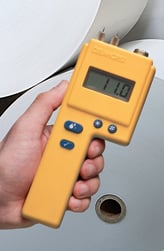
Moisture can be a major concern for a variety of industries, such as:
- Restoration
- Building Inspection
- Agriculture
- Flooring & Wood Products
- Paper Products
- Leather Making
In these industries, the moisture content of various materials needs to be carefully monitored to provide the best results.
For example, if there’s too much moisture in wood floors, they could buckle, warp, or grow mold. Baled hay on the farm could spontaneously combust if it has too much moisture.
When you need to monitor the moisture content of materials for your work, you need a fast, reliable way to perform tests so that you have the information you need to get on with your work.
Moisture meters are an excellent tool for getting moisture content readings in different materials quickly. However, not all moisture meters are created equally. Some types of meters are better suited for certain tasks than others.
How can you pick out the best moisture meter for your needs? Here are a few tips:
#1: Consider the Types of Materials You’ll Be Testing
Different moisture meters excel at checking different types of materials. For example, pin-type meters with extended-length probes are better for checking loosely-packed materials such as insulation or hay than pinless moisture meters are.
On the other hand, pinless moisture meters excel at providing quick readings when used on flat materials such as walls or wood floors.
Other materials may even require more specialized testing equipment. One example of this would be soil. To test the available moisture of soil, simple metal probes won’t cut it.
Instead, a specialized moisture meter for soil with gypsum sensor blocks would be the best choice. The gypsum blocks can absorb or bleed moisture until they reach equilibrium moisture content (EMC) with the surrounding soil, allowing growers to check how much moisture is available to the crops they’ve planted and adjust their irrigation methods accordingly.
#2: Consider Species and Specific Gravity of Materials
Even among materials that fit within a single category, such as wood, different moisture meters may provide different levels of accuracy when used to check them. This is because each moisture meter is calibrated to work best with a specific kind of material, and using it to test a different material throws off reading accuracy.
For example, say you’re checking for the %MC of wood in a structure. Some of this structure is composed of white oak, but the rest is built from redwood. If you were to use the same moisture meter to check both materials without making species corrections, you would get two different reading results, even if the actual %MC of both materials was exactly the same.
When looking for a moisture meter for testing any material, make sure that the moisture meter you get is designed for that type of material, or has a species correction feature that allows you to get an accurate reading for the material you need to test.
#3: Ease of Use
If a moisture meter isn’t user-friendly, it becomes difficult and time-consuming to use. This kind of defeats the basic premise of a moisture meter: which is to provide a fast and reliable moisture content reading.
When looking for a moisture meter, consider the ease of use of whatever model you look at.
For example, is the reading screen easy to read? Are the menus (if any) easy to navigate? Will you have to constantly go through different menu options to get to one function that you use a lot?
These are a few questions that directly relate to the user experience you’ll have with a given moisture meter. Asking yourself these questions ahead of time can help you decide if a given meter is right for you or not.
#4: Manufacturer Support
One of the biggest signs of whether or not a given moisture meter will be high quality is to check the manufacturer’s track record when it comes to support. This means not only checking their warranty policy, but inspecting their dealings with other customers.
Does the moisture meter manufacturer have a history of going above and beyond to help the professionals who use their moisture meters? If so, odds are good that they’ll have a rugged, reliable product you can count on.
On the other hand, if the manufacturer has a history of dodging customer questions and concerns while doing whatever they can to avoid providing warranty support, you may want to reconsider their product.
Finding the perfect moisture meter to meet your needs can be tough. But, with a little help from a trusted manufacturer, you can get the tools you need to get the job done.

Comments